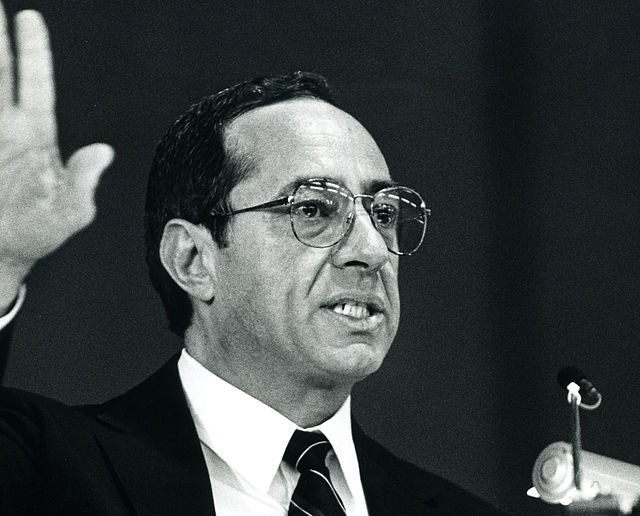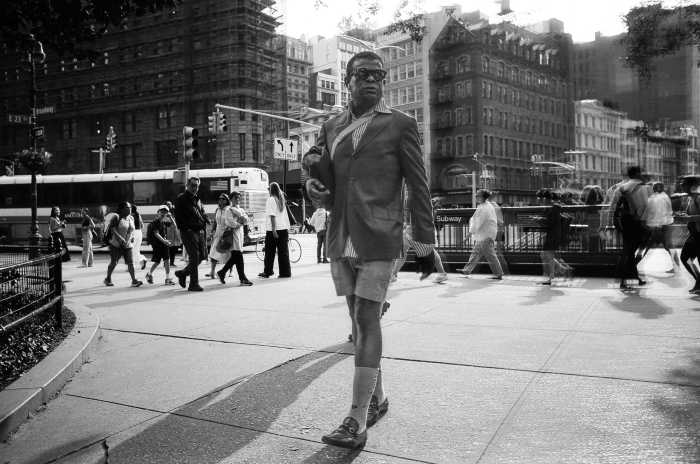Updated Friday, Jan. 2, 5:26 p.m.
Former three-term Gov. Mario Cuomo, once a leading and passionate voice for the liberal wing of the Democratic Party and one of the most important political figures to come from Queens, died on Thursday. He was 82.
Cuomo, who was raised in Jamaica, passed away only hours after his son, Gov. Andrew Cuomo, was sworn in for a second term during an inauguration held in Lower Manhattan at the World Trade Center.
The elder Cuomo had been ill for months. His last public appearance was on Election Night when he was with his son during a victory celebration.
Gov. Cuomo spoke about his father during his inaugural address Thursday morning, noting that “we’re missing one family member.” Cuomo spent New Year’s Eve with his ailing father and family, even reading him his speech.
“He couldn’t be here physically today, my father. But my father is in this room. He is in the heart and mind of every person who is here. He is here and he is here,” Cuomo said pointing to his head and heart. “And his inspiration and his legacy and his experience is what has brought this state to this point. So let’s give him a round of applause,” Cuomo said.
According to the governor’s office, Mario Cuomo “passed away from natural causes due to heart failure this evening at home with his loving family at his side.”
Cuomo was remembered as an important voice in both state and national politics.
“From the hard streets of Queens, Mario Cuomo rose to the very pinnacle of political power in New York because he believed in his bones in the greatness of this state, the greatness of America and the unique potential of every individual,” said Sen. Charles Schumer.
“My prayers and thoughts are with the governor, the whole Cuomo family, and all who knew and loved Mario,” Schumer said. “Our hearts go out to Gov. Andrew Cuomo who gave a great speech today that I am certain his father was proud of.”
In a statement issued by the White House Thursday night, President Obama paid homage to Cuomo as “an Italian Catholic kid from Queens, born to immigrant parents,” who “paired his faith in God and faith in America to live a life of public service — and we are all better for it.”
“He rose to be chief executive of the state he loved, a determined champion of progressive values, and an unflinching voice for tolerance, inclusiveness, fairness, dignity and opportunity,” Obama said in his prepared statement.
The son of Italian immigrants who owned a grocery store in South Jamaica, Cuomo cut his political teeth in Queens.
Cuomo first rose to public prominence in 1972 when he was appointed by Mayor John Lindsay as a mediator during bitter a dispute over a proposal to build low-income public housing towers in upper-middle Forest Hills. Prior to that, he had successfully represented Queens homeowners in high-profile disputes with the city and private developers.
Cuomo lost two early political contests — first a Democratic primary for lieutenant governor in 1974 and then the 1977 Democratic primary for mayor of New York City when he was defeated by Ed Koch. He won his first campaign in 1978 in the race for lieutenant governor.
He ran for governor four years later, defeating Koch in the Democratic primary before going on to win the general election.
Cuomo graduated from St. John’s Preparatory School and attended one year at St. John’s University before he was lured away from college by an offer to play baseball for a minor league affiliate of the Pittsburgh Pirates. But after suffering a serious injury when he was hit in the back of the head by a baseball, he returned to St. John’s University.
Cuomo went on to earn a law degree at St. John’s, where he continued to teach part-time while he practiced law in both the private and public sector before entering politics.
As a Democratic governor during President Reagan’s administration, Cuomo was among the few in his party to challenge the then-popular president. He became the leading voice for the party’s liberal wing even as the nation skewed conservative in the 1980s.
It was his stunning keynote speech during the 1984 Democratic Convention in San Francisco that fueled speculation that Cuomo could seek the presidential nomination down the road. Cuomo himself continued to stoke the speculation until the last hour before the filing deadline for the New Hampshire primary in 1991.
But he remained a prominent voice within the party, known and admired for his soaring oratory.
Cuomo came up in 1993 as a potential Supreme Court nominee by President Clinton. But then in his third term as governor he removed his name from consideration for the top court.
Cuomo is survived by his wife of 60 years, Matilda Raffa Cuomo, his children Margaret, Andrew, Maria, Madeline and Christopher, and 14 grandchildren.
A wake will be held for Cuomo on Monday at the Frank E. Campbell Funeral Home, located at 1076 Madison Ave. in Manhattan, with calling hours from 1 to 5 p.m. and from 7 to 10 p.m. The following day, a funeral service will take place at the St. Ignatius Loyola Church at 980 Park Ave., also in Manhattan, at 11 a.m.
RECOMMENDED STORIES



































